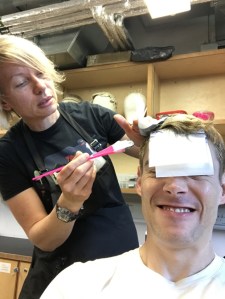Review: Sweet Bird of Youth (Chichester Festival Theatre)
Marcia Gay Harden stars as the fading Hollywood star in Tennessee Williams’ play
Tennessee Williams‘ play is a tale of two comebacks – or attempted comebacks, at least. Alexandra Del Lago, or ‘the Princess’, a faded Hollywood star, has gone on an epic pills and booze bender after fleeing the premiere of her come-back movie; she couldn’t stand the horror of suddenly seeing her aging face in close-up. On the way, she picked up gigolo and wannabe actor Chance Wayne, whose comeback is also a homecoming, as he drives her to the Gulf of Mexico town where he grew up. He wants to show off his new wealthy lifestyle, and be reunited with his childhood sweetheart, Heavenly – but last time he was home he infected her with a venereal disease, and he’s now a wanted man.
It’s a ripe set-up, even by Williams’ standards, but with juicy potential for big performances. The loss of youth and beauty, the terror of aging, and the failure of artistic ambitions – themes that haunted Williams – are wrung out violently in Sweet Bird of Youth. But Jonathan Kent delivers a solid account of such neuroses, rather than a rattling one.
American film actress Marcia Gay Harden, making her UK stage debut, can be magnificently haughty as the Princess; her commanding grandeur is real, not just a mockable pose. And while she’s also raddled with insecurities and a bit desperate (for affection; for recognition; for sex), Harden finds the mordant wit in the part too. Her delivery swoops one moment, snaps the next, then unravels in naughty cackles, as fruity as they are throaty.
She isn’t really matched by Brian J Smith as Chance. He starts at fever pitch, and has nowhere to go. Chance moves from self-delusion to self-sacrifice via a lot of drunken histrionics, but there are not enough occasions here that really suggest much going on beneath Smith’s slurring southern drawl. At times, it feels like the production skates over the shiny surface of Williams’ melodrama, making a lot of light and heat but not illuminating much depth.
The relationship between Chance and the Princess – one of mutual opportunism turned mutual dependence – is the heart of the play. But there’s also good work between Victoria Bewick as a pleasingly resistant, spiky Heavenly (an underwritten part that you suddenly long for more of) and the excellent Richard Cordery as her father, a grossly hypocritical Republican obsessed with racial and sexual purity. Under his auspices, we’re led to understand, a black man was castrated in the town the previous week. Cordery gives him a dash of comic bluster, and a bigger slug of genuinely scary self-righteous zeal: a potent cocktail.
Anthony Ward’s imposing set may be idly distracting, but enjoyably so. A huge white glossy sheet (of metal? fibreglass?) hovers over the stage, like bed clothes thrown up in the air, a suspended erotic moment that also provides a soft surface for Mark Henderson’s sugary-toned lighting. Beneath, oversized shutters and long, angled wooden floorboards suggest the warped perspective of the drunk, or dreamer. Never mind ‘ready for my close-up’: it’s as if the set captures the reeling moment a movie camera zooms sharply out, in horror.
Sweet Bird of Youth is at Chichester Festival Theatre until 24 June.














